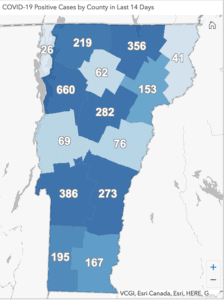Down slightly over last week’s record
By Erin Petenko/VTDigger and Polly Mikula
Vermont reported 1,448 Covid-19 cases within the past week, a slight decline from 1,520 the week before but far higher than the 1,050 cases reported just two weeks ago, according to a state data presentation. It was still the second highest week of Covid cases ever reported in the state. (The high mark this past winter/spring’s high was 1231 cases in a week.)

Covid-19 positive cases in the last 14 days by county.
At a press conference Tuesday, Mike Pieciak, commissioner of the Department of Financial Regulation, said that slight downward trend, combined with much lower numbers nationally, were a positive sign for the state.
But Pieciak did not include a state data forecast in his presentation, as he has at most press conferences. He said the CDC ensemble model no longer forecasts national cases beyond one week.
He noted that less-vaccinated states’ case counts have dropped faster than more vaccinated states have. Much of the South, including Florida and Mississippi, have reported declining cases.
The Covid-19 rate remains far higher among unvaccinated Vermonters. Unvaccinated people are 4.3 times more likely to contract Covid and 3.1 times more likely to be hospitalized, the data shows.
According to a state report last week, the gap is narrower for deaths: Unvaccinated people are 1.2 times more likely to die of Covid-19.
That could be due to the state’s skewed vaccination rate among older Vermonters. The average breakthrough case in Vermont is 69 years old, and the average breakthrough death (of which there have been few so far) is 79 years old, Pieciak said.
Hospitalizations have also dropped slightly in the past week, but deaths from the virus have risen. The state has reported 33 deaths so far in September, compared with just two in July and 20 in August, the data shows.
Orleans County reported the highest rate of the virus, followed by Essex (two of the smallest counties in the state both in the Northeast Kingdom), Rutland and Windsor Counties came in next. Rutland reported 386 cases in the past 14 days—significantly higher than the week prior; and Windsor reported 273 cases, about inline with the week prior and again over the state average.
College campuses
Pieciak cited one trend that shows the positive impact of the vaccine in close-contact settings: Colleges have so far reported fewer cases this semester compared to spring 2021, despite holding more in-person classes and events and more students living on campus.
That could be the result of the state’s 95% vaccination rate among college students, he said.
Long-term care
Levine said long-term care facilities have also shown the benefits of getting vaccinated. He displayed a chart that shows that deaths among facility residents in this wave are fewer, and among older people than deaths in April 2020 and over the winter.
“Each and every death due to Covid-19 has been a deep loss for friends, families and our communities,” he said. “But although this virus has taken a tragic toll, we are fortunate we now have vaccines to protect more of these residents.”
According to the DFR report, 11 long-term care facilities have active outbreaks as of Tuesday, totaling 177 cases. Locally, there are currently 17 Covid cases at Equinox Terrace in Manchester and St. Joseph Kervick Residence in Rutland, according to Pieciak.
About 87.8% of Vermonters 12 and older have started the vaccination process, including about 2,200 in the past week. In total, 69.3% of the state’s population is fully vaccinated, placing Vermont first in the nation.




